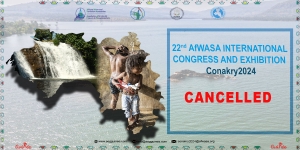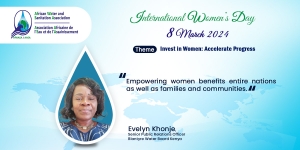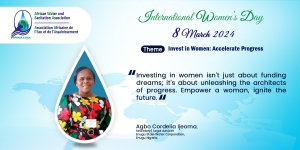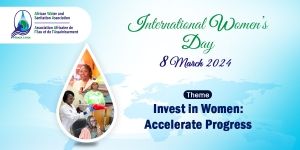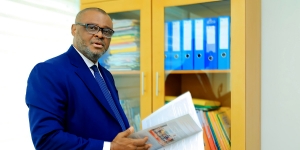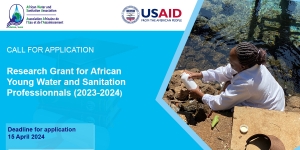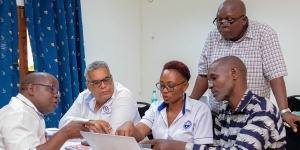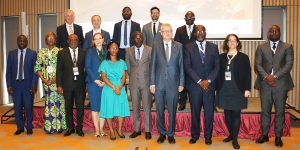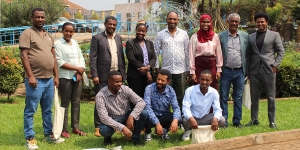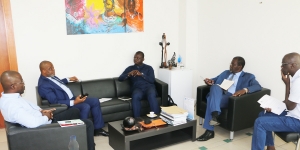Nzickonan Stéphanie
The 22nd AfWASA International Congress and Exhibition Conakry2024 has been cancelled
Dear Members and Friends,
We deeply regret to inform you that our 22nd International Congress and Exhibition, initially scheduled from February 18 to 22, 2024 in Conakry, Republic of Guinea, is cancelled for reasons of force majeure relating to an explosion that occurred in a fuel depot in Conakry, during the night of December 17 to 18, 2023.
Given the situation, the Government of the Republic of Guinea, through the Minister of Energy, Hydraulics and Hydrocarbons, officially requested AfWASA on January 2, 2024, to postpone the event.
On January 9, 2024, AfWASA Executive Board, in collaboration with Société des Eaux de Guinée (SEG), the local organizer of the Congress, sent a mission to Guinea to meet the authorities and assess the situation. Following this mission, it was concluded that it was impossible to organize such a large-scale event this year, leading to its outright cancellation.
We sincerely apologize to our members, partners, and friends for any inconvenience this cancellation may cause and look forward to seeing you at our next Congress, scheduled from February 17-20, 2025 in Kampala, Uganda.
Thank you very much for your understanding.
The Executive Director
Olivier GOSSO
AfWASA is celebrating women in the water and sanitation sector
Women make up half of the world's population and to fully realize human potential, they must be fully involved in all facets of society. Not only is it morally required to invest in women's empowerment and gender equality, but it is also strategically necessary to promote sustainable development and advance global progress.
Empowering women benefits entire nations as well as families and communities. When given equal opportunities in leadership, employment, and education, women significantly contribute to social stability, economic prosperity, and innovation. Numerous studies show that empowering women enhances their general well-being, lowers poverty, and improves their health and education. At Blantyre Water Board in Malawi, through the “Sustaining the Flow of Lide and Development (SLD) Program, there are deliberate plans to empower women for taking up leadership positions to reduce the gender inequality.
As the world commemorates the 2024 International Women’s Day, I implore on governments, organizations and communities to direct their focus on investing in women for accelerated progress in development projects. Women are frequently at the forefront of developmental projects such as community development and environmental preservation. Women who are economically and socially empowered are better able to support sustainable development and environmental preservation.
Gender equality is a fundamental human right for all and not just a problem for women. Equal opportunity and treatment should be given to all people, regardless of their gender. Society can unleash the potential and abilities of its whole populace and promote inclusivity and diversity by eliminating gender-based discrimination.
Beyond the scope of society, gender equality is a cross-cutting issue that expedites progress across all development objectives, from eradicating poverty to advancing high-quality education.
On the occasion of International Women's Rights Day, AfWASA celebrates the dynamism and commitment of the women of its network
As we embrace the significance of International Women's Rights Day on March 8, the AfWASA is proud to launch a communication campaign that spotlights the dynamism and unwavering commitment of the incredible women within our network. This year's theme, "Invest in Women, Accelerate Progress," resonates deeply with the core values we hold dear.
Investing in women's empowerment is not just a noble cause; it is a strategic imperative for driving progress on a global scale. The dynamism and resilience displayed by the women in our network are a testament to the transformative impact that occurs when opportunities are extended, and barriers are dismantled.
Gender equality is not only a fundamental human right but a necessary foundation for a peaceful, prosperous, and sustainable world. When we invest in women, we invest in communities, economies, and the future. The empowerment of women is a catalyst for positive change, fostering innovation, inclusivity, and social cohesion.
Let us use this day to reflect on the strides we have made and the work that lies ahead. By supporting and uplifting women, we not only enhance their lives but contribute to the advancement of society as a whole. The empowerment of women is not a singular event; it is an ongoing journey that requires collective effort and commitment.
As we embark on this communication campaign, let's celebrate the achievements of the women in our network, share their stories of resilience, and inspire others to join us in the pursuit of a world where every woman has the opportunity to thrive.
Thank you for your dedication to the cause of women's rights and empowerment.
Best regards,
Agbo Cordelia Ijeoma
AfWASA is celebrating women in the water and sanitation sector
On the occasion of International Women's Rights Day, the African Water and Sanitation Association celebrates the dynamism and commitment of the women of its network.
AfWASA recognizes that women play a key role not only as water users and decision makers at the domestic level but also as water managers and providers.
The Association believes in the fact that investing in women does not only benefit the individual but also society as a whole and has demonstrated this through the establishment of women professional networks in its member utilities, investing in capacity development, and mentorship programs all aimed at ensuring qualified women occupy decision-making positions in the water and sanitation sector.
This has no doubt contributed to an equal opportunity for some of its women in leadership and brought about some transformative changes within the sector. There still remains a lot to be done, and this is being expressed through the quotes of our women.
Mr. François Olivier Gosso, New AfWASA Executive Director
Message from the President of the African Water and Sanitation Association (AfWASA) related to the recruitment of the new AfWASA Executive Director.
Dear Members and Partners,
I am pleased to inform you of the recruitment and effective assumption of duty since January 1st, 2024, of Mr. François Olivier Gosso as the new Executive Director of the African Water and Sanitation. He replaces Mr. Sylvain Usher, appointed Advisor to AfWASA Executive Board.
This new governance marks a significant milestone in the evolution of our association, and I am convinced that this transition will bring new and enriching perspectives for all our members and partners.
Mr. François Olivier Gosso is a General Engineer, specializing in electromechanics. He chaired the AfWASA Non-Revenue Water Working Group from 2012 to 2015 and then served as Chairman of the Scientific and Technical Council (STC) from 2014 to 2018. He also held the position of Production Director, and Advisor to the Managing Director of Société de Distribution d'Eau de Côte d'Ivoire (SODECI).
His experience, vision, and expertise will undoubtedly be invaluable assets in strengthening and developing our water and sanitation initiatives on the continent.
I encourage all of you to warmly welcome him and support him in his new role.
I would also like to extend my gratitude to Mr. Sylvian Usher, the outgoing Executive Director, for his many years of dedication and selfless service as Executive Director.
I wish them every success in their new mission.
Dr. Eng. Silver MUGISHA
President of AfWASA
Research grants: AfWASA provides financial support to African water and sanitation students
As part of its Capacity-Building Program for African stakeholders in the water, sanitation, and hygiene sector AfWASA Capacity Building Program (AfriCap), funded by USAID, the African Water and Sanitation Association is awarding research scholarships to African Young Water and Sanitation Professionals. Target beneficiaries are master students and engineers at their final year training program. Each scholarship, with a maximum value of USD1,000 (one thousand), will make it possible to carry out a research work sanctioned by a scientific report on a theme related to the WASH sector.
During the 2016-2017, 2017-2018, and 2018-2019 academic years, AfWASA awarded sixty (60) scholarships to students from eleven (11) countries in West and Central Africa. Other scholarships will be awarded across Africa for a period of three years (2021-2024). For the 2021-2022 academic year, fifteen (15) scholarships were awarded to students from 13 countries. For the academic year 2022-2023, other twenty (20) scholarships from 16 countries and, among the selected fellows 15 were given by USAID as the usual Africap grants and 5 were given to young women by Bill and Melinda Gates Foundation through SAO CWIS to close the gender gap in WASH research. For the final academic year (2023-2024), 15 scholarships will be awarded to students across Africa.
Application process
Candidates for the scholarship program will formulate their research topics in relation to one of the themes proposed in this call for applications. To apply, applicants must fulfill the following requirements:
-
Be a citizen of a sub-Saharan African country eligible for USAID funding.
-
be in good standing academically with respect to their institution.
-
Submit an application file including:
-
Student card or registration receipt for the current year
-
Last completed degree
-
Curriculum vitae (3 pages max)
-
Three recommendation letters (one should be from the academic supervisor)
-
During the selection, priority will be given to students and young water professionals who are registered as members of AfWASA.
Submission
Applicants must submit their application online via the link for application https://docs.google.com/forms/d/19aMW5SGELWreMImeBg5Idjls4PceRNjiTAHTQXh4ArM/edit . For any question regarding application or submission, applicants may contact the following addresses: This email address is being protected from spambots. You need JavaScript enabled to view it. and copy This email address is being protected from spambots. You need JavaScript enabled to view it..
The list of successful candidates will be published on AfWASA website: www.afwasa.org and each beneficiary will receive an official notification from AfWASA.
Submission deadline
Students wishing to participate in the program are requested to submit their full application by April 15, 2024. The list of recipients for the 2023-2024 academic year shall be published by June 15, 2024.
Research themes
The following themes were selected for this scholarship program for the 2023-2024 academic year:
-
Approaches to reducing Non-Revenue Water in water utilities
-
Improved Water Quality Control
-
Water services in low-income urban areas
-
Improvement of urban and peri-urban sanitation
-
ICT use (Digitalization) in water and sanitation services
-
Water resources management
-
Water, sanitation, and gender.
-
Circular economy
-
Climate change
Financial aspect
As part of this scholarship, the maximum amount allocated per recipient is US $ 1,000. Sixty percent (60%) of this amount will be paid to the recipient once the detailed plan of the research project is finalized, approved by the research supervisor, and received by AfWASA Research Program Coordinator. The remaining forty percent (40%) shall be paid once the recipient submits the electronic version of their final research report.
Reporting conditions
Students receiving the AfWASA grant will be required to regularly prepare and submit a monthly report on the status of their work and a final report at the end of the project.
CWIS concept: AfWASA builds capacity among Kenyan stakeholders
UNHABITAT, in partnership with the African Water and Sanitation Association (AfWASA), organized a capacity-building workshop for city sanitation stakeholders in Malindi, Kenya, from February 5 to 7, 2024.
The aim of the training was to familiarize participants with the CWIS (City-Wide Inclusive Sanitation) approach as well as the tools, materials and resources available to assist in the design and implementation of CWIS projects, to facilitate the integration of CWIS principles and framework into programming approaches, designs and development of water and sanitation programs. The aim was also to share best practices and relevant experiences in urban sanitation approaches and strategies for scaling up.
During the workshop, the global sanitation situation was presented, with particular emphasis on the situation in Kenya. Group work, presentations and case studies enabled participants to familiarize themselves with the fecal sludge management toolbox. They also discussed institutional strengthening and commitment to CWIS, and reviewed the CWIS policies of some international organizations.
At the end of the training, participants expressed their satisfaction with the workshop, which had given them a better understanding of CWIS. They pledged to integrate this approach into their program and project planning.
The City Wide Inclusive Sanitation (CWIS) initiative is an approach that aims to promote the provision of equitable, safe and sustainable sanitation services in the city. It uses a number of tools (CWIS toolbox, full list of CWIS indicators) to take stock of the existing situation in terms of service provision and/or sanitation-friendly environment, with the aim of guiding actions to achieve sanitation for all within a city.
Wastewater management: German industrialists present cutting-edge technologies to Ivorian decision-makers and stakeholders
Under the patronage of the Federal Ministry of Economics and Climate Protection (BMWK), the association German Water Partnership e. V. (GWP) in collaboration with the German Economic Delegation in Côte d'Ivoire (AHK Côte d'Ivoire) and the African Water and Sanitation Association (AfWASA) recently organized a business trip to the water supply and wastewater treatment sector in Côte d'Ivoire.
The aim of the trip was to promote German capacity building in the water supply and wastewater treatment sector in Côte d'Ivoire, and to explore business and partnership opportunities with Ivorian companies.
The visit included a symposium on the main business and financing opportunities in the water sector in Côte d'Ivoire. It enabled German companies to present their projects to a network of Ivorian decision-makers and entrepreneurs, government authorities, multipliers and sector associations. The conference also provided an opportunity to promote German environmental technologies, which significantly reduce the operating and maintenance costs of urban and industrial water and effluent management systems, and offer opportunities for optimizing waste resources.
In addition to the symposium, participants from German companies benefited from a program consisting of technical visits to relevant projects, as well as meetings with decision-makers in the field of efficient water management.
The mission was an excellent opportunity to establish business contacts and generate opportunities for cooperation and technology transfer between German and Ivorian companies.
It should be noted that the event was attended by a number of distinguished guests, including H.E. Mr Mattias Veltin, Ambassador of the Federal Republic of Germany, Mr Fidèle Béhibro, Technical Advisor to the Ministry of Hydraulics, Sanitation and Hygiene, representing Minister Bouaké Fofana, and Dr Irina Kerner of the German Federal Ministry for Economic Affairs and Climate Protection.
Ethiopian sanitation stakeholders on benchmarking visit to Uganda to enhance sanitation access in their country
As part of the activities of the SAO CWIS program by the African Water and Sanitation Association (AAEA), funded by the Bill and Melinda Gates Foundation, Ethiopian representatives from the sanitation sector are embarking on a benchmarking visit to the National Water and Sewerage Corporation of Uganda (NWSC). This initiative aims to strengthen partnerships among African nations to overcome persistent challenges related to limited access to improved sanitation services.
Access to improved sanitation remains a major challenge, particularly in East Africa, where almost a quarter of the population practises open defecation and 40% use unimproved latrines.
The overall objective of this benchmarking visit which takes place from January 22 to 26, 2024, is to facilitate learning and knowledge-sharing on the provision of water and sanitation services (WASH). Specifically, the goals include leveraging governance, institutional, and regulatory tools and structures to enhance integrated sanitation services; promoting access to safe sanitation services in communities; progressively improving waste management practices, water, sanitation, and hygiene through innovative approaches, and learning by practice—scaling innovative ideas through on-the-ground practices and models.
It is worth noting that benchmarking, a central element of the operator partnership developed by AfWASA, facilitates the exchange of expertise on tools and approaches used for providing inclusive sanitation services on an urban scale. This process involves an experienced service provider acting as a mentor to strengthen the capacities of another provider in need of assistance and guidance. The aim is to foster peer-to-peer learning, allowing teams to draw lessons from best practices in sanitation and hygiene and adapt them to their specific context.
This visit underscores AfWASA's ongoing commitment to promoting regional collaboration and working towards sustainable and inclusive sanitation solutions in Africa.
AfWASA about to sign collaboration agreement with CGRE
The Director of the Water Resources Management Center (WRMC) of ECOWAS Commission, Mr. Kouakou Alexis Kouassi, paid a courtesy call to AfWASA Executive Board on Wednesday, January 17, 2024. The purpose of the visit was to explore opportunities for collaboration between the two entities, particularly with regard to the joint organization of regional events.
Mr. Kouakou was welcomed by the Executive Director of AfWASA, assisted by the Executive Board Advisor, the Director of Membership Services, the Senior Water Programs Coordinator, and the Communications Manager.
Discussions began with a presentation of the two organizations, followed by the identification of potential areas of collaboration, namely (i) capacity building of water and sanitation stakeholders to improve governance, (ii) development of African expertise in the sector, (iii) co-organization of sector events and (iv) advocacy on relevant issues.
At the end of the meeting, the both parties expressed their satisfaction with the topics discussed, and agreed to meet in the near future to deepen the discussions and formalize this cooperation framework. Following this, the Director of the WRMC expressed his interest in joining AfWASA.
About the WRMC
Created on December 21, 2001, the Water Resources Management Center (WRMC) has been operational since March 12, 2004. It’s responsible for monitoring and supervising ECOWAS activities in the field of water management and the implementation of the Regional Action Plan for the integrated management of water resources in West Africa (PAGIRE/AO).

 English
English  Français
Français 
